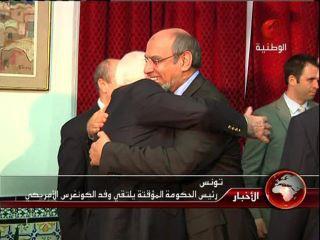Senator John McCain's visit to Tunisia on Thursday, February 23, 2012, left Tunisian Internet users angry over what they called Ennahda‘s ‘double standards.’ Hundreds of Facebook comments, dozens of tweets and many pictures filled social media platforms frequented by Tunisians after a controversial picture of Tunisian Prime Minister, Hamadi Jebali, (who was Ennahda's secretary general) hugging the Senator.
It seems the act of government officials angered many Tunisians because of McCain's Zionist affiliation as Zionism is not welcome in Tunisia like other Arab-Muslim countries. McCain was in Tunisia as part of a senatorial delegation, which took part in the Friends of Syria conference, which was held in Tunis, and which sought support for the Syrian opposition.
On YouTube, Tunisian netizens edited a video of the warm reception McCain received:
This video generated a buzz as many Tunisians said that Jebali welcomed McCain more warmly than he should have.
Comments erupted on satirical Facebook page “Hidden Facts.” Most of them expressed outrage at what they called “hypocrisy” from the Prime Minister, who is a leading figure in the Islamist party Ennahda.
One of the comments on the page reads [ar]:
النهضة بعدما تجلت للأعين والقلوب عوراتها، صارت منقصة حقيقية يجب على من يخشى الله حقاً أن يتملص منها.
النهضة : “الإسلام” المُؤجل .. لحين إشعارٍ آخر!!!
Ennahda's new motto is Islam is postponed until further notice.
Another comment reads:
The conversation even escalated to hostile comments against the United States of America and the state of Israel.
Nevertheless, the discussion also included opinions from Tunisians who thought that Jebali's act was a purely calculated and political move [fr]:
Il est ou le problème? la politique c'est ça. Cette photo rassure l'occident et fait voir que les musulmans ne sont pas des terrorristes comme ils le disent et un gouvernement islamlque n'est pas dangeureux, et fait ouvrir les portes du tourisme , et pas mal d'autre avantages.
The spat drew almost 200 comments and more than 100 shares.
Another Facebook page, Ennahda's Gags, reacted to the visit of Senator McCain with the following photograph:

The caption of this photograph was a criticism to Ennahda's policy which – according to many Tunisians – lacks clarity and riddled with a double standard.
The following comment explains the point:
أتوجه بكلامي لحركة النهضة و قياداتها ، غيروا شعاركم فأنتم أبعد ما يكون عن الصدق
This is for Ennahda and its leadership, change your slogans because you are far from honesty.
Tunisians didn't lose their reputed sense of humor and very soon, the same Facebook page released a new picture of Jebali holding the British potato chips brand, McCain.

The Tunisian twittersphere wasn't impartial either. Tunisian Twitter users’ reactions started trickling with the news of the visit.
Mohamed Ali Chebâane tweets:
@MedAliChebaane: Senator John McCain to Visit #Tunisia to discuss the southern border security issues :D Here we are Boys! shar.es/gt1Q7
The “hear we are Boys” comment refers to many opinions in Tunisia that the U.S. administration is using the Arab Spring to reform its foreign policy in the Middle East.
Then after the video of Jebali and McCain was aired on State TV, Tunisian tweeple changed their tone. @Arabicca1 led the series of tweets first with [ar]:
https://www.facebook.com/photo.php?v=234704163291176 الشعب يريد تحرير فلسطين غير ان الوزير يستقبل الصخيوني بالعناق
@Arabsta1 then added to the commentaries with the following ironic tweet:
@Arabasta1: : بصراحة النهضاوي اللي ما يفيقش على وضعو اليوم ماعادش فيه أمل حتى يوم الدين!”
The tweets in fact resemble most of the comments on Facebook in which Twitter users highlighted their disagreement with the visit of the U.S. delegation to Tunisia and the double standards of Ennahda before and after the elections.
@Ooouups:Mais le parti #Ennahdha doit être sympa avec ses maîtres si non ils coupent les robinets !!! #Jbali #McCain
With the escalation of violence in Syria, Tunisia's has taken a leading decision in foreign policy in the Middle East. Yet, Tunisia's involvement to help the Syrian people determine freely the political path of their nation is under-represented in a bewildered Tunisian media. But, as always, social networks remain the main platform for Tunisians to express their views and opinions regarding the latest decision of their government.






